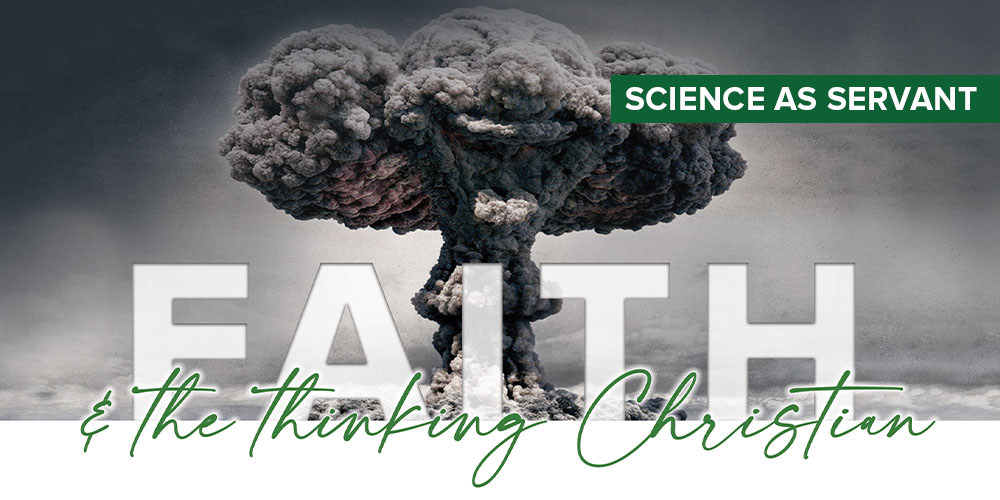 |
Early one morning, the team gathered on the open plain. Staring at the tower in the distance, they waited. All of their intense, combined efforts over the past many months led to this. They hoped to be awestruck by the light and might radiating upward from that tower into the heavens above.
These weren’t the descendants of Shem in Genesis 11. They weren’t on the Mesopotamian plain of Shinar. This was the Jornada del Muerto desert of New Mexico in July 1945. And while they spoke English, French, German, and Hungarian, the language that united them was science.
Their project was not the tower itself, which stood a mere 100 feet tall. The tower was only there to elevate their creation—a plutonium weapon of mass destruction that would change the course of a world at war.
The project director, Dr. Robert Oppenheimer, had named the testing site “Trinity.” On that site, the first atomic bomb erupted into a mushroom cloud that rose more than 7 miles into the atmosphere. When later asked what went through his mind as he watched this fiery inferno, he quoted a verse from the Bhagavad Gita: “Now I am become Death, the destroyer of worlds.”
The proper place of science
The detonation of a nuclear fission bomb might be the most dramatic use of science in the last century. But it’s just one of a long list of scientific achievements that inspire awe and respect.
Yet some people do more than respect science. They seem to worship it as the way, the truth, and the life. They claim the scientific method is the universal language that unites humanity. They exclude all but scientific discovery as the revealer of truth, and they place their hope in scientific applications as the savior of our planet.
Science has not destroyed the world. But some assert that it has destroyed the worldview of Christianity, which worships another as the Way, the Truth, and the Life. Christians rightly balk when science and faith are pitted against each other. The thinking Christian appreciates both, understanding the proper place of science within God’s kingdom. Science is simply a tool in the hands of human beings. It does not destroy. It cannot save.
Apply this thought to a simpler product of ancient technology: a brick. A brick can be used for good by a mason to build a house, providing shelter and safety. The same brick can be used for evil by a rioter to smash a window, destroying shelter and safety, even taking a life. It’s not about the brick. It’s what a person does with the brick—and why.
Which brings us to that plain in Shinar . . .
Read Genesis 11:1-9.
- How did the people use the advanced technology of bricks and tar to seek their own glory instead of God’s glory? If they wanted to glorify God, they would have obeyed his specific command to spread over the face of the earth. That would have been reflected in using simple and quick building materials like stone. Instead, they used “advanced technology” of the day to bake bricks and secure enough tar to build something permanent. They showed that they had no intention of obeying glorifying God. Rather, they intended to make a name for themselves. This self-directed glory is a picture of humanism.
- Why was God so concerned about their project that he halts it by confusing their language? Just as a parent disciplines a child to “nip in the bud” their disobedience before it blossoms into full-blown, permanent rebellion, God intervenes dramatically before their self-absorbed disobedience is out of control. (Romans 1 describes what that looks like). It’s actually humorous how Moses describes God’s perspective of man’s tower. To the men of Shinar, it was colossal. They were so impressed with what they had built. To God it was so puny he had to “come down” so that he could actually see their Tinker Toy Tower! God was in no way intimated by man’s actions. He was concerned for these people he loved.
- How do people today worship science as the answer to humanity’s problems? Our arrogant sinful nature would rather look inward to ourselves, rather than outward to God, to solve our problems. Science is a human endeavor, and a blessing from God to be sure. Rightly used, God blesses our use of science to benefit our lives and address many problems. But when people look to science as the ultimate revealer of truth in all things, they put science in the place of God. It’s no longer a tool that’s used in service to God. It becomes the source of all understanding. This is called Scientism. More on this in the next article.
Read Acts 2.
- Why is Pentecost considered the reversal of Babel? 2. What is the only thing that can save humanity? The good news of Jesus Christ is the one thing that properly reunites humanity. It transcends the world’s various “nations, tribes, peoples and languages” (Revelation 7) like nothing else can. Our sinful nature uses our language barriers as a reason to fear and distrust another. The gospel of Jesus removes the sinful barrier between us and God. It also removes the barrier of distrust between different people groups that began at Babel. The dissonant babbling at Shinar is replaced by beautiful harmony already on earth between Christians of different cultures. We’ll experience this harmony perfectly in heaven when we are all gathered before the Lamb.
This is the first article of a six-part series on faith and science.
Author: James Borgwardt
Volume 108, Number 1
Issue: January 2021
- Faith and the thinking Christian: Part 6: Evolution and the thoughtful Christian
- Faith and the thinking Christian: Part 5: Home field advantage
- Faith and the thinking Christian: Part 4: Does faith hinder scientific discovery?
- Faith and the thinking Christian: Part 3: The misperception of scientific certainty
- Faith and the thinking Christian: Part 2: The limits of science
- Faith and the thinking Christian: Part 1: Science as servant






